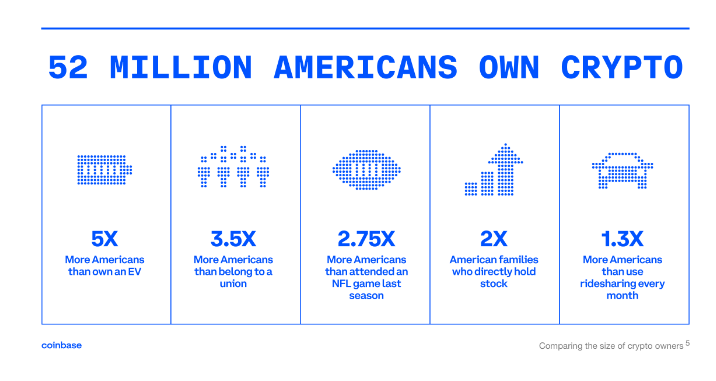A strong emphasis on organizing in AZ, CA, GA, IL, NH, NV, OH, PA, and WI is part of the September 27th Stand with Crypto Day in Washington, DC.
In summary: Almost nine out of ten Americans think it’s time to update the financial system, but individuals in positions of power who support the status quo—outdated structures that restrict the economic freedom and opportunities available to regular Americans—are obstructing change. With a strong focus on nine crucial states, we are beginning an initiative today to organize 52 million cryptocurrency owners—a population younger and more varied than the US overall—into a potent force before the 2024 elections. Give your congressman a call in a minute if you are concerned about cryptocurrencies.
It’s time to disrupt the current quo by modernizing the system
Coinbase conducted research earlier this year to learn more about Americans’ perceptions of the financial system. It discovered that the majority of people desire change. Fifty-one percent of Americans think that the financial system in America does not work equally for everyone, and nearly nine out of ten (87%) Americans think that the financial system needs to change. Merely 14% of respondents express optimism over the financial system’s future, with the majority believing that it serves the interests of everyone but themselves.³
Their beliefs about reaping the benefits of blockchain technology’s democratizing potential are supported by earlier research:
- Strong interests are unfairly favored by the system, according to 63% of cryptocurrency owners1.
- More than 40% of people with digital assets in bellwether states like Nevada, Ohio, and Pennsylvania use them to send money abroad to assist family members in paying for housing, food, and medical care at a significantly lower cost than banks and wire services normally charge1.
- Of those between the ages of 18 and 34, 72% concur that “digital assets are the future of finance” and 72% think that “crypto gives people direct control over their money.”
The existing quo is depending on a “enforcement only” strategy to maintain a financial system that the great majority of people want changed when it comes to leveraging blockchain technology to help make our financial system more open, more participatory, and more democratic. While more and more members of Congress are in favor of legislation that would regulate cryptocurrencies and advance the financial system, some are content to maintain the status quo. Furthermore, the will of the people might propel advancement in a democracy.
52 million Americans are significant.

This is a group of Americans that will influence future cultural, political, and economic trends in addition to being a sizable absolute number. Compared to the general population, cryptocurrency owners are younger, more diversified, middle-class, and employed.
According to a poll conducted in the fall of 2022, more over half (55%) of respondents in the crucial states of NH, NV, OH, and PA said they would be less likely to support candidates who opposed web3 and cryptocurrency. In contrast, 61% of Americans supported Joe Biden for president in 2020.
Cryptocurrency requires clear regulation in order to modernize the financial system and transcend the current quo.
Crypto needs clear, sensible legislation. The present “enforcement only” strategy jeopardizes global leadership, employment, and innovation.
Globally, nations are progressively advancing their responsible crypto-forward regulatory frameworks in order to strategically position themselves as “crypto hubs” and draw in new, creative businesses, employment opportunities, and income. According to Electric Capital’s developer study from March, as web3 development shifts more and more overseas, the US might lose out on one million developer jobs and three million related non-technical positions over the course of the next seven years.
As the fundamental technology that will modernize the global financial system, cryptocurrency is essential. If the US gives up its role in developing technology that will be essential to the global financial infrastructure, the US’s position as the world’s economic leader and national security will be jeopardized, as China is embracing and promoting the use of technology, including digital assets, to project power. Clear regulations are essential for maintaining American leadership in the international financial system, according to 87% of F500 CEOs polled, and 46% of them cite regulatory ambiguity as a deterrent to investment.⁴
The Financial Innovation and Technology for the 21st Century Act (“FIT21”) presents a robust regulatory framework with precise definitions, consumer protections, and a path for regulation that does not inhibit innovation. It is the finest first step toward clear, reasonable legislation. With bipartisan support, the Financial Innovation and Technology for the 21st Century Act passed both the House Financial Services Committee and the House Agriculture Committee in the United States House of Representatives. It is expected to be brought to the House floor for a vote this autumn.
It’s time for Congress to hear from the 52 million Americans who possess crypto
We’re urging more than 52 million crypto owners⁸ and activists to utilize their voices to stand behind crypto. In order to accomplish this, The Stand with Crypto Alliance is launching a 14-month campaign with three main components:
- Leveraging the Coinbase platform to mobilize crypto owners into single issue crypto activists. With the help of Stand with Crypto’s decentralized software, which is accessible through the Coinbase app, over 100,000 people have already taken action since the organization’s founding a few weeks ago.
- a thorough paid media campaign spanning all media channels, which includes the national rollout of digital and outdoor ads in Washington, DC, which were unveiled today.
- The campaign will specifically target nine states that are over-index in terms of the number of cryptocurrency owners. In these states, on-the-ground organizing will be conducted by full-time field organizers. Stand with Crypto has successfully organized events in Ohio, Nevada, Georgia, and Montana over the past few weeks, putting its ability to unite supporters of cryptocurrency to the test. A major emphasis will be placed on the following states as part of the 52 million Americans that hold cryptocurrency: AZ, CA, GA, IL, NH, NV, OH, PA, and WI. We will discuss each state in greater detail later, but for now, let’s focus on Georgia. Our goal is to create a crypto club with at least 11,779 members.
We are starting this effort today by mobilizing the community’s collective energy and moving the battle from X (previously known as Twitter) to the phones. The campaign will encourages advocates and owners of cryptocurrencies to set aside one minute each day to phone their congressional representative and request that they pass legislation that is clear and reasonable.
Paid advertising and in-person events in DC will display the demographics of cryptocurrency owners. Developers, entrepreneurs, and innovators from throughout the nation will fly into Washington, DC, on September 27 for a Stand with Crypto Day, when they will advocate publicly with members of Congress and other government officials. They will discuss how the cryptocurrency industry is boosting economic activity and jobs in their home states, as well as the significance of the US abandoning its enforcement-only policy, which is pushing innovation, leadership, and jobs abroad. All of these prominent cryptocurrency supporters have chosen to remain in the United States and apply blockchain technology to modernize our financial system.
The goal of Stand with Crypto is to mobilize one million people, but just think of the impact if we could turn even 10% of the 52 million cryptocurrency owners in America into advocates for a single cause. That would revolutionize the way we challenge the status quo and push for laws that would modernize our financial systems to make them more inclusive, equitable, and distributed.
